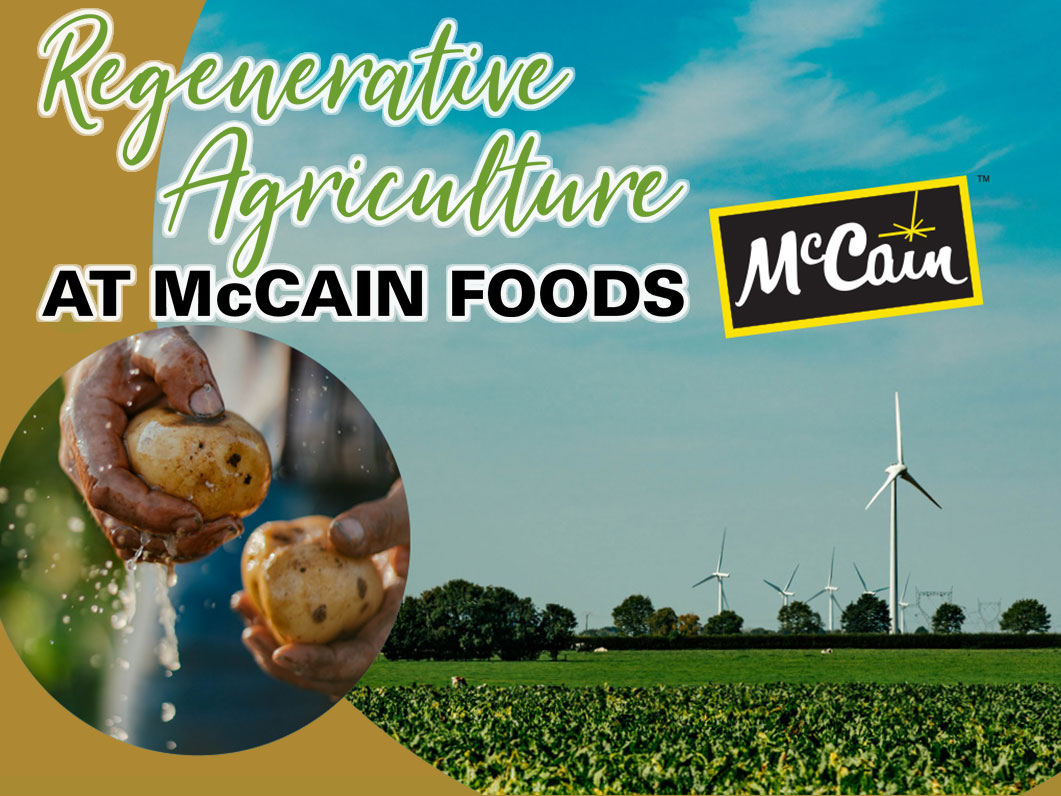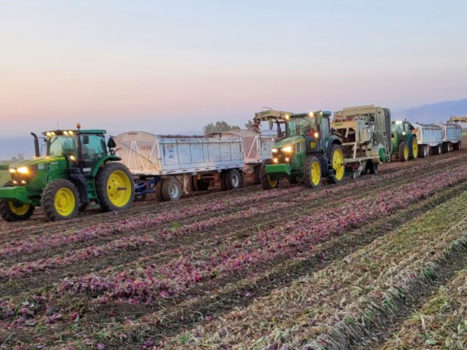Two major names in the onion industry, McCain Foods and L&L Ag, are showing the world how an ecosystem-based farming practices are showing enormous benefits in ag sustainability overall and onion growing in particular.
McCain Foods recently launched a #FarmerSpotlightSeries as part of its Sustainability Week that ran in early June, and featured were father/son onion farmers Larry and Kerrick Bauman of L&L Ag in Connell/Pasco, WA. Several social media links put the Baumans in a well-earned spotlight.
Jess Newman, McCain’s Director of Agriculture and Sustainability for the Appetizer Division (which includes onions), explained the week and the program to us.
“We were proud to feature the Baumans in our Farmer Champion Spotlights on social media during our sustainability week,” Jess told us. “Besides being lovely people and partners, they have been early adopters of several sustainable farming practices like drip irrigation, diverse rotations, real-time moisture sensing and irrigation scheduling, variable rate fertilization and gentler weed/pest control methods. They are great stewards who are always looking to push the envelope.”
She added, “We are excited to continue the regenerative journey with them.” Jess provided the following links to McCain posts “bragging on how awesome the Baumans are,” and they can be found at Facebook https://www.facebook.com/107340207666255/posts/317477273319213/;
Instagram https://www.instagram.com/p/CP3hVCgNcSM/?utm_medium=copy_link;
and Twitter https://twitter.com/mccainglobal/status/1402314129508012035?s=20.
We asked Jess to explain RegAg, and she said, “McCain is proud to announce our new commitment that we will implement regenerative agricultural practices across 100 percent of our acres by 2030. We define regenerative agriculture as an ecosystem-based approach to farming that aims to improve farm resilience, yield, and quality by improving soil health, enhancing biodiversity, and reducing the impact of conventional inputs.”
She continued, “We are taking action now because of the impact climate change is having on our farmers and their livelihoods, from droughts to wet harvests to stagnating yields. In terms of what may change for a grower, McCain would encourage and support practices like reduced tillage across the rotation, cover cropping, reducing the frequency and intensity of chemical applications, variable rate input application and more diverse rotations.”
Noting that McCain has “ambitious goals,” Jess said, “We don’t yet have all the answers to get there. And those answers won’t be uniform, because each of our growers’ situations is unique.”
And, she said, “We are excited to partner with our growers in the regions where we buy onions as we identify and test practices, measurement criteria, business cases, and support programs. We are just starting the journey and want farmer input!”
The operation partners with growers in multiple areas, and Jess said, “McCain’s commitment covers all of our grower-direct crops in the U.S. – potatoes, sweet potatoes and onions. Globally, McCain has 3,500 growers on five continents farming.” That represents some 370,000 acres, she said.
“For U.S. onions, we aim to work with all of our growers on making progress toward this goal. We know many of our growers have already taken significant action on reducing their footprint and have clear ideas of what they want to trial next. We aim to be a partner in this.”
We asked how the program might evolve, and Jess answered, “We are just at the beginning of this journey, and we’re working to establish a regenerative practice framework and criteria for onions, validate with our growers and determine what research partnerships and financial support are needed to meet our ambitious goals.
“This hard work and rigor will pay off by allowing us to set the industry gold-standard for sustainability and tell the story of onion production to an even wider audience. In the long term, McCain believes we will see impacts like reduced carbon emissions, increased organic matter and more yield resilience to climate shocks.”
McCain Agronomist Bob Simerly told us that RegAg is “a very large, serious and global effort on the part of McCain,” and he said, “At McCain foods collaborating with our growers to support their continued transition to regenerative agriculture is a key part of our journey towards planet-friendly food.”
He said that journey “starts with McCain’s commitment to invest in our understanding of regenerative agricultural practices, costs and benefits at our own farms of the future.” And, he added, “Our goal at the farms of the future is to demonstrate that these practices are both economically viable and scalable. Through public-private partnerships and collective action we aim to accelerate research into regenerative agricultural practices and support our industry to transition quickly and at scale.”
“Sustainability,” Bob said, is more than methodology. It’s a lifestyle. The company’s co-founder, Harrison McCain, was born on a potato farm in the Canadian province of New Brunswick, and the roots of his upbringing run deep.
Bob quoted Harrison: “If you don’t get the agronomy right, nothing else matters.” The McCain attitude is that “good land stewardship is in our DNA,” Bob said.” Our planet-friendly journey reflects both McCain’s core values and our customer expectations.”
In its Sustainability Week, McCain not only announced its commitment to promote RegAg with its growers but also announced its “Farms of the Future.”
Bob said, “These are research farms where RegAg practices will be evaluated and proof tested. Initially they will be focused on potatoes, but many practices will be of use to onion growers too. The first McCain Farm of the Future will be in New Brunswick where the company headquarters is located.”
By 2025 the three Farms of the Future will be “dedicated to developing regenerative agricultural practices,” he said.
For McCain’s onion focus, Bob said, “We are also working on deploying the Cool Farm Tool to our onion growers. This is a spreadsheet that calculates the per acre ‘carbon footprint’ for onion production. The goal is to track atmospheric carbon release now as a benchmark and work toward reducing it in the future. Some growers have already been contacted about this initiative.”
Download the McCain one-page flyer explaining their initiative below.



